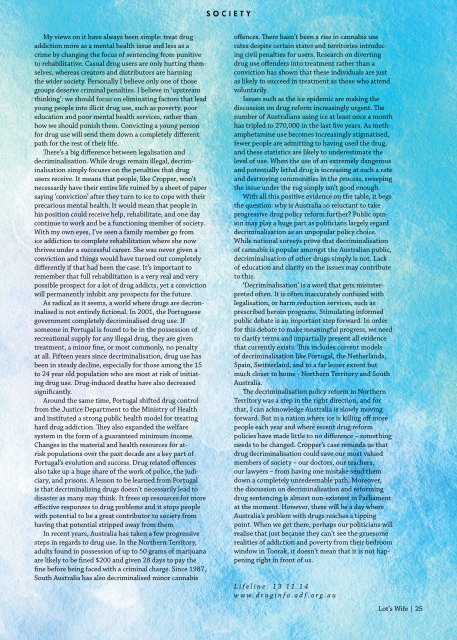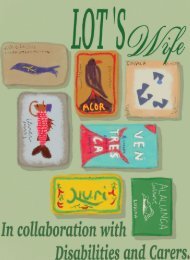Lot's Wife Edition 4 2016
Create successful ePaper yourself
Turn your PDF publications into a flip-book with our unique Google optimized e-Paper software.
SOCIETY<br />
My views on it have always been simple: treat drug<br />
addiction more as a mental health issue and less as a<br />
crime by changing the focus of sentencing from punitive<br />
to rehabilitative. Casual drug users are only hurting themselves,<br />
whereas creators and distributors are harming<br />
the wider society. Personally I believe only one of those<br />
groups deserve criminal penalties. I believe in ‘upstream<br />
thinking’: we should focus on eliminating factors that lead<br />
young people into illicit drug use, such as poverty, poor<br />
education and poor mental health services, rather than<br />
how we should punish them. Convicting a young person<br />
for drug use will send them down a completely different<br />
path for the rest of their life.<br />
There’s a big difference between legalisation and<br />
decriminalisation. While drugs remain illegal, decriminalisation<br />
simply focuses on the penalties that drug<br />
users receive. It means that people, like Cropper, won’t<br />
necessarily have their entire life ruined by a sheet of paper<br />
saying ‘conviction’ after they turn to ice to cope with their<br />
precarious mental health. It would mean that people in<br />
his position could receive help, rehabilitate, and one day<br />
continue to work and be a functioning member of society.<br />
With my own eyes, I’ve seen a family member go from<br />
ice addiction to complete rehabilitation where she now<br />
thrives under a successful career. She was never given a<br />
conviction and things would have turned out completely<br />
differently if that had been the case. It’s important to<br />
remember that full rehabilitation is a very real and very<br />
possible prospect for a lot of drug addicts, yet a conviction<br />
will permanently inhibit any prospects for the future.<br />
As radical as it seems, a world where drugs are decriminalised<br />
is not entirely fictional. In 2001, the Portuguese<br />
government completely decriminalised drug use. If<br />
someone in Portugal is found to be in the possession of<br />
recreational supply for any illegal drug, they are given<br />
treatment, a minor fine, or most commonly, no penalty<br />
at all. Fifteen years since decriminalisation, drug use has<br />
been in steady decline, especially for those among the 15<br />
to 24 year old population who are most at risk of initiating<br />
drug use. Drug-induced deaths have also decreased<br />
significantly.<br />
Around the same time, Portugal shifted drug control<br />
from the Justice Department to the Ministry of Health<br />
and instituted a strong public health model for treating<br />
hard drug addiction. They also expanded the welfare<br />
system in the form of a guaranteed minimum income.<br />
Changes in the material and health resources for atrisk<br />
populations over the past decade are a key part of<br />
Portugal’s evolution and success. Drug related offences<br />
also take up a huge share of the work of police, the judiciary,<br />
and prisons. A lesson to be learned from Portugal<br />
is that decriminalising drugs doesn’t necessarily lead to<br />
disaster as many may think. It frees up resources for more<br />
effective responses to drug problems and it stops people<br />
with potential to be a great contributor to society from<br />
having that potential stripped away from them.<br />
In recent years, Australia has taken a few progressive<br />
steps in regards to drug use. In the Northern Territory,<br />
adults found in possession of up to 50 grams of marijuana<br />
are likely to be fined $200 and given 28 days to pay the<br />
fine before being faced with a criminal charge. Since 1987,<br />
South Australia has also decriminalised minor cannabis<br />
offences. There hasn’t been a rise in cannabis use<br />
rates despite certain states and territories introducing<br />
civil penalties for users. Research on diverting<br />
drug use offenders into treatment rather than a<br />
conviction has shown that these individuals are just<br />
as likely to succeed in treatment as those who attend<br />
voluntarily.<br />
Issues such as the ice epidemic are making the<br />
discussion on drug reform increasingly urgent. The<br />
number of Australians using ice at least once a month<br />
has tripled to 270,000 in the last five years. As methamphetamine<br />
use becomes increasingly stigmatised,<br />
fewer people are admitting to having used the drug,<br />
and these statistics are likely to underestimate the<br />
level of use. When the use of an extremely dangerous<br />
and potentially lethal drug is increasing at such a rate<br />
and destroying communities in the process, sweeping<br />
the issue under the rug simply isn’t good enough.<br />
With all this positive evidence on the table, it begs<br />
the question: why is Australia so reluctant to take<br />
progressive drug policy reform further? Public opinion<br />
may play a huge part as politicians largely regard<br />
decriminalisation as an unpopular policy choice.<br />
While national surveys prove that decriminalisation<br />
of cannabis is popular amongst the Australian public,<br />
decriminalisation of other drugs simply is not. Lack<br />
of education and clarity on the issues may contribute<br />
to this.<br />
‘Decriminalisation’ is a word that gets misinterpreted<br />
often. It is often inaccurately confused with<br />
legalisation, or harm reduction services, such as<br />
prescribed heroin programs. Stimulating informed<br />
public debate is an important step forward. In order<br />
for this debate to make meaningful progress, we need<br />
to clarify terms and impartially present all evidence<br />
that currently exists. This includes current models<br />
of decriminalisation like Portugal, the Netherlands,<br />
Spain, Switzerland, and to a far lesser extent but<br />
much closer to home - Northern Territory and South<br />
Australia.<br />
The decriminalisation policy reform in Northern<br />
Territory was a step in the right direction, and for<br />
that, I can acknowledge Australia is slowly moving<br />
forward. But in a nation where ice is killing off more<br />
people each year and where recent drug reform<br />
policies have made little to no difference – something<br />
needs to be changed. Cropper’s case reminds us that<br />
drug decriminalisation could save our most valued<br />
members of society – our doctors, our teachers,<br />
our lawyers – from having one mistake send them<br />
down a completely unredeemable path. Moreover,<br />
the discussion on decriminalisation and reforming<br />
drug sentencing is almost non-existent in Parliament<br />
at the moment. However, there will be a day where<br />
Australia’s problem with drugs reaches a tipping<br />
point. When we get there, perhaps our politicians will<br />
realise that just because they can’t see the gruesome<br />
realities of addiction and poverty from their bedroom<br />
window in Toorak, it doesn’t mean that it is not happening<br />
right in front of us.<br />
Lifeline: 13 11 14<br />
www.druginfo.adf.org.au<br />
Lot’s <strong>Wife</strong> | 25

















